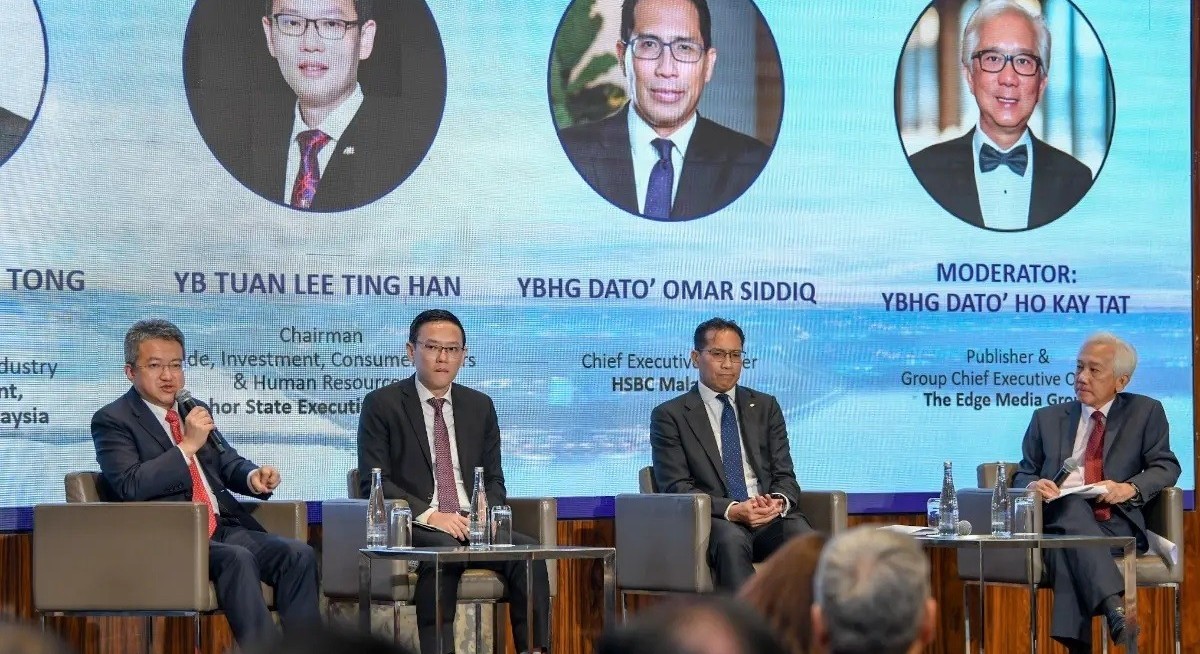Stakeholders stressed that structural issues around labour mobility and talent retention must be urgently addressed if the JS-SEZ is to drive inclusive and sustainable growth.
“Malaysia doesn’t have a talent problem. Malaysia has a pay problem,” Deputy Minister of Investment, Trade and Industry Liew Chin Tong said on Monday. “We pay low wages at home and then watch our skilled workers go to Singapore. There are 1.1 million Malaysians working across the border... that equation has to change”.
Liew was speaking during the “Dialogue Session — A New Growth Catalyst” event, hosted by The Edge Malaysia and HSBC, featuring the Johor State Executive Council’s investment, trade, consumer affairs and human resources committee chairman Lee Ting Han, and HSBC Malaysia chief executive officer Datuk Omar Siddiq.
Liew added that while infrastructure and tax incentives matter, Malaysia must place equal emphasis on developing local companies, investing in high-value capabilities, and ensuring that skilled workers are compensated fairly.
See also: JS-SEZ ‘once-in-a-generation opportunity’ for cross-border investors, says CGSI’s Tay Wee Kuang
“We need to start investing in Malaysian and Singaporean companies here. Not just land sales. Use our land to exchange for technology and equity. Localise the supply chain,” Liew added.
The wage gap between Johor and Singapore is not new, but the concern has gained fresh urgency with the upcoming launch of the Johor Bahru–Singapore Rapid Transit System (RTS) Link, expected to move 10,000 commuters per hour across the border by end-2026.
Lee of Johor’s state exco noted that while the RTS will improve cross-border efficiency, it may also accelerate talent outflow if high-value jobs in Johor lag behind.
See also: Singapore-based companies have committed over $5.5 bil worth of investments into Johor: DPM Gan
“The RTS [may] be ready... but on our side, the jobs that we need to create to keep the talent are not ready yet?” he said.
“We have to look at this not as brain drain, but as brain circulation. The key is pay.”
Johor Menteri Besar Datuk Onn Hafiz Ghazi, earlier in his keynote address, said that the state is currently working with the Ministry of Human Resources and TalentCorp to introduce a salary guidance framework for the 11 promoted sectors under the JS-SEZ.
The framework, expected to be released this quarter, aims to serve as a benchmark for employers and provide clearer compensation expectations across key industries.
Call for deeper policy integration across the causeway
Beyond wages, speakers also called for deeper policy coordination between Malaysia and Singapore — particularly in workforce planning, capital allocation, and industrial development strategies.
“Malaysia and Singapore have complementary strengths. We should be thinking about building the next Huawei or Samsung — not just as an MNC (multinational corporation) attraction play, but as a regional supply chain hub we co-own,” Liew said.
He pointed to the fact that both countries have manufacturing-to-gross domestic product (GDP) ratios above 20%, and overlapping strengths in semiconductors, precision engineering, and advanced materials.
To stay ahead of Singapore and the region’s corporate and economic trends, click here for Latest Section
Meanwhile, Omar Siddiq added that while investor sentiment towards the JS-SEZ has been largely positive, policy continuity and commitment will be crucial, and clarity is essential to sustain investor interest and attract long-term capital.
“The fundamentals are strong — access to infrastructure, rule of law, talent, and market,” he said. “But what investors want now is assurance that this collaboration is institutionalised and consistent.”
He added that harmonising policies around labour, mobility; and environmental, social, and governance (ESG) standards would greatly benefit small and medium enterprises (SMEs) and ensure more inclusive participation in JS-SEZ supply chains.




